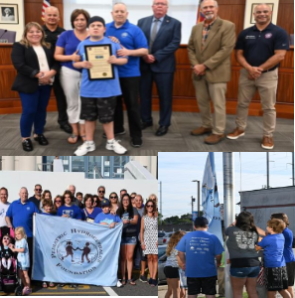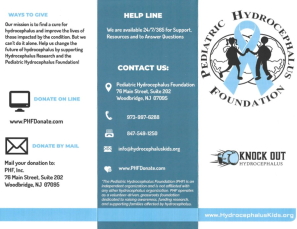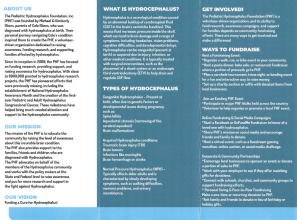Fairfield Couple Co-Hosts ZenRide Benefit To Honor Their Little Girl
October 21, 2017 by PHF
Filed under Uncategorized
Comments Off on Fairfield Couple Co-Hosts ZenRide Benefit To Honor Their Little Girl
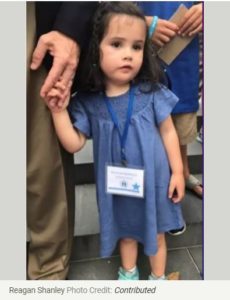 FAIRFIELD, Conn. — ZenRide Spinning Studio and Fairfield residents Cindy and Tim Shanley on Oct. 22 will present the 3rd annual “Biker-Barre” to help fund a cure for hydrocephalus, a brain condition the Shanleys’ little girl lives with every day.
FAIRFIELD, Conn. — ZenRide Spinning Studio and Fairfield residents Cindy and Tim Shanley on Oct. 22 will present the 3rd annual “Biker-Barre” to help fund a cure for hydrocephalus, a brain condition the Shanleys’ little girl lives with every day.
Located at 869 Post Road, ZenRide will offer a spinning and Bar Method combo class at 3 p.m. After that, participants can stay on for refreshments and a silent auction to benefit the cause.
All proceeds will go to the all-volunteer Pediatric Hydrocephalus Foundation.
The Shanleys support the effort to honor their daughter, Reagan — “Rae Rae” to her friends and family — who has hydrocephalus, and to raise both awareness and research dollars.
The last two Biker-Barre events have raised almost $20,000 each.
The event’s success allowed the Shanleys to create the Reagan Sloane Shanley Scholarship for applicants interested in neuroscience and/or engineering who have a special interest in better understanding hydrocephalus, cerebral spinal fluid and the brain.
A $40 donation reserves a bike for the spinning class.
To register, visit zen-ride.com/reserve.
To make a donation, visit active.com/donate/phfzenride2017.
To learn more about hydrocephalus, visit www.HydrocephalusKids.org.
Source: 
As she battles brain disease, Isabella Sacharczyk is on a mission to help others
October 18, 2017 by PHF
Filed under Uncategorized
Comments Off on As she battles brain disease, Isabella Sacharczyk is on a mission to help others
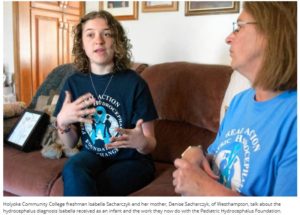
WESTHAMPTON MA — “Water on the brain.”
These are the words that echoed in Denise Sacharczyk’s mind on one of the worst days of her life.
A doctor called to tell her that her newborn daughter, Isabella, had hydrocephalus, the buildup of fluid in the brain. The 2-month-old had fought for her life from bacterial meningitis and wasn’t expected to live. The infection led to a stroke, which led to the fluid. A deadly amount of pressure has risen inside the child’s skull.
Isabella was rushed by ambulance to Boston for brain surgery, leaving her mother and father, Kenneth, distraught. Doctors said she would never talk or walk. They questioned whether she would ever see or hear.
“They told us that we should probably think about putting her in a home for kids like her,” says Sacharczyk. “We chose not to do that, naturally.”
That was 19 years ago and Isabella Sacharczyk is still here. A freshman at Holyoke Community College, she lives with her family in Westhampton. She also lives with hydrocephalus which never went away. She has undergone 23 brains surgeries, so far, but there is no cure. The fluid is not exactly water, but more like a saline, that collects around the brain. It creates constant pain in her head.
“She has lived such a life of pain, even just trying to go to school can be really hard,” says her mother.
Isabella Sacharczyk looks like an ordinary teenage girl, petite with wavy brown hair down to her shoulders. She has exceeded all expectations. She not only walks and talks, she plans to pursue a doctorate in computational biology after she completes her undergraduate studies in computer science. One day she hopes to work alongside researchers in the laboratory at Boston Children’s Hospital to help find a cure for hydrocephalus. In the meantime, she and her mother hold regular fundraisers in conjunction with the Pediatric Hydrocephalus Foundation, an organization based in New Jersey to advance research for children; they have a crafts fair scheduled for Saturday at Eastworks in Easthampton (See box below).
“I’ve made it my mission to hopefully be part of the team that cures hydrocephalus or finds better treatment,” Isabella says.
A lifetime of misery
Hydrocephalus affects more than 1 million Americans in every stage of life, from infants to the elderly. One to two of every 1,000 babies are born with it, making it as common as Down’s syndrome, according the the Hydrocephalus Association, an organization based in Maryland.
“There are approximately a hundred reasons why someone might develop the condition,” says Dr. Thomas Kaye, Chief of Neurosurgery at Baystate Medical Center in Springfield. It most often affects people at the end or beginning of life, coinciding with conditions like birth trauma or dementia.
Most healthy people’s brains produce two cups of fluid every day that is then absorbed back into the body. When the natural absorption process goes haywire, the typical treatment is surgery to implant a mechanical system including a valve and tubing inside the brain to drain fluid to another part of the body, often to the lining around the stomach or the lungs. But it’s not uncommon for these systems to fail, says Kaye.
“The (tubing) that they put in is basically a Band-Aid — it’s a mechanical device that has the highest failure rate of all mechanical devices put into a body,” Denise Sacharczyk says.
Isabella has spent a large percentage of her young life in hospital beds. She’s had thousands of MRIs and CT scans. Sometimes the tubing that drains fluid into other parts of her body will start to deteriorate, catch on scar tissue, and Isabella will start to get sick. Her mind goes foggy, she can’t read, or concentrate. She gets tremors in her legs, her eyes become bloodshot.
“Bella lives every day with the uncertainty that at any moment her shunts could fail,” Denise Sacharczyk says. They could break, become infected or clogged, which means she is being rushed into surgery — brain surgery — again, she says.
Isabella recalls one particularly rough year: “I had six surgeries, back to back within months of each other.”
In ninth grade, at Hampshire Regional High School in Westhampton, Isabella would regularly take refuge in the nurse’s office, often spending the entire day there. Sometimes her sister, Victoria, 16, would help her with school projects when she wasn’t feeling well. In 10th grade, the pressure inside her skull caused her brain to press onto her spine causing hemorrhaging. After an emergency surgery to push her brain back up she woke up and couldn’t walk. She spent the next 10 months regaining her motor skills. She still has to use a cane. And every day she remains vigilant, not knowing if the drainage system in her brain will fail.
Moved to action
Despite all of this, Isabella Sacharczyk has found a bright spot related to her disease — a passion to dedicate her life to finding a cure and better treatments that will help others.
Four years ago, when the family was looking for support, they connected with the Pediatric Hydrocephalus Foundation. Through the organization they were able to meet other families who have children with hydrocephalus. And now, as Massachusetts state chapter co-directors, the Sacharczyks host regular events to raise awareness and money to find a cure. So far they have held three annual walks at Hampshire Regional High School, with the most recent one in September. They also hold an annual carnival-themed fundraiser in New York state where they have family.
Last year’s fundraisers raised $12,000 for research at Boston Children’s Hospital. One of the doctors from the hospital attended the walk at Hampshire Regional and invited Isabella to visit the laboratory in Boston to shadow the researchers. She spent last summer observing their work.
In addition to holding fundraisers, mother and daughter have traveled to Washington D.C. to lobby for more funding to study the disease.
“We go and we storm Congress with all the folks from across the country,” Denise Sacharczyk says.
Isabella still has some difficulty with balance and spasticity in her legs, but it’s been two years since the drainage system in her brain has failed, the longest she has gone between operations since her first one at 2 months old.
Her mother often thinks of the grim prognosis doctors gave her newborn.
“I think about that all the time — being that scared, brand new mom 19 years ago in the hospital. Hydrocephalus has this huge stigma that your child is not going to do anything, but our children are growing up and doing wonderful things.”
“She is my miracle girl.”
Lisa Spear can be reached at Lspear@gazettenet.com
Shop for a Cure
A craft and vendor fundraising event to benefit hydrocephalus research.
When: Saturday, 10 a.m. to 4 p.m.
Where: Eastworks 116 Pleasant St., Easthampton
What: Vendors will sell handmade crafts like crocheted scarfs and quilted flowers to help fund hydrocephalus research at Boston’s Children’s Hospital.
Contact: Call 413-246-9725 for more information.
To learn more about pediatric hydrocephalus, visit www.HydrocephalusKids.org.
Fundraiser held for teenager battling incurable brain condition
August 2, 2017 by PHF
Filed under Uncategorized
Comments Off on Fundraiser held for teenager battling incurable brain condition

HORSEHEADS, N.Y. (WENY) — The community came together to help raise money for a teenage girl battling an incurable brain condition.
On Sunday, the third annual “Bella’s Journey” fundraising event was held at Raymour and Flanigan in Horseheads.
The event was created by the family of Bella Sacharczyk, who is an eighteen-year-old girl battling with Hydrocephalus.
Throughout the day there were many things for visitors to do to raise money and awareness for the condition.
“We’re having a basket raffle, all donated by different people in the community,” said Bella’s Mother and the Massachusetts State Chapter Director for the Pediatric Hydrocephalus Foundation, Denise Sacharczyk. “We have a bounce house and food. We had the radio station was here today and we’re just raising money for Hydrocephalus for the awareness of Hydrocephalus and for the research.”
Since Bella has been diagnosed with the condition, she has had twenty-three brain surgeries and countless hours of physical therapy to learn how to walk again.
If you want to know more about the condition, visit http://www.hydrocephaluskids.org.
‘Bella’s Journey’ to raise funds against brain disease
July 2, 2016 by PHF
Filed under Uncategorized
Comments Off on ‘Bella’s Journey’ to raise funds against brain disease
“Bella’s Journey” is coming back to the Southern Tier.
Raymour & Flanigan, in Horseheads, will host the second annual local fundraising event in partnership with Pediatric Hydrocephalus Foundation and 17-year-old Bella Sacharczyk.
The teenager lives with hydrocephalus, an incurable brain disease. She has survived 23 brain surgeries. Sacharczyk’s mission of raising awareness and money to fund research projects has resulted in a $7,000 research grant to one of the nation’s top pediatric hospitals.
The local fundraiser will be held from noon to 5 p.m. July 10 at the store, 137 Colonial Drive in Horseheads. There will be live music, face painting, games, activities, bake sales, raffles, silent auctions and vendors.
The Pediatric Hydrocephalus Foundation, an all-volunteer, nonprofit charitable organization, educates the community by raising the level of awareness about hydrocephalus, and provides support to families, friends and children affected by this brain condition.
The PHF also raises money for and works with the medical community in searching for a cure and additional treatment options for those with hydrocephalus. Additionally, the PHF advocates on behalf of the members of the hydrocephalus community, and works with policy makers at the state and federal levels to raise awareness and push for more research and support in the fight against hydrocephalus. All donations are tax-deductible. Visit HydrocephalusKids.org for more information.
Follow Kelly Gampel on Twitter @theSGphotos or on Instagram @kelly.gampel
Edison family hosts dinner to benefit Hydrocephalus research
November 21, 2015 by PHF
Filed under Uncategorized
Comments Off on Edison family hosts dinner to benefit Hydrocephalus research
 Jennifer Westdyke of Edison found out her son Jeffrey likely had hydrocephalus when she was 20 weeks pregnant. Her son, now 9, has battled the disease since birth, undergoing his first brain surgery when he was 3 years old and another two since then.
Jennifer Westdyke of Edison found out her son Jeffrey likely had hydrocephalus when she was 20 weeks pregnant. Her son, now 9, has battled the disease since birth, undergoing his first brain surgery when he was 3 years old and another two since then.
To raise awareness about this incurable brain condition, the Westdyke family is hosting a Funding a Cure for Hydrocephalus Pasta Dinner with the Pediatric Hydrocephalus Foundation on Sunday, Nov. 22, from 2 to 6 p.m. at the Edison Elks 2487 at 375 Old Post Road in Edison.
Hydrocephalus is a condition in which the primary characteristic is excessive accumulation of fluid in the brain, according to the National Institute of Neurological Disorders and Stroke. Some people think of hydrocephalus as “water on the brain;” however it is actually cerebrospinal fluid — a clear fluid that surrounds the brain and spinal cord, according to the institute.
Hydrocephalus can be acquired or congenital. The congenital form is present at birth and may be caused by either genetics or events that occurred during fetal development. Acquired hydrocephalus can develop at the time of birth or at some other point after because of injury or disease.
“There hasn’t been any new technology in a long time,” said Westdyke. “They are still using the same shunt technology from the 1950s.”
She said compared to others with the disease, her son has been fortunate; he is highly functioning, attends regular classes in school and hadn’t had many surgeries. “My son is not the norm. There are many children who have had 30 or 40 surgeries and have had many other problems as a result,” she said.
Hydrocephalus is generally treated by surgically inserting a shunt system that diverts the flow of cerebrospinal fluid to another area of the body where it can be absorbed as part of the normal circulatory process.
The family’s goal with the pasta dinner is to raise awareness about the disease and money to help research.
“Hydrocephalus is an incurable brain condition that affects one in ever 500 newborns, and over a million Americans,” she said. “Adults affected include veterans coming home and football players with head injuries.”
The pasta dinner will feature homemade food, entertainment and more.
“My mom and I rolled 500 meatballs, and my friend makes a great salad that everyone comes back for more,” along with homemade desserts, she said. “We have a DJ, face painting, basket raffles, a 50-50 and vendors, who donate profits. It should be a very fun evening.”
There will be a special appearance by MJX & The 2 Bad Crew Special Needs Dance Class.
It’s all you can eat, and tickets are $10 per adult and $5 per child (4 and younger are no charge).
The Pediatric Hydrocephalus Foundation was founded in New Jersey in 2009 by four families, each having a child with this incurable brain condition, said Michael Illions, the organization’s vice president and director of advocacy. The non-profit charitable organization’s goal is to raise awareness about hydrocephalus and provide support to families, friends and children affected by the condition.
“This is our fifth dinner to raise money,” he said. “We have been very successful in the past, drawing professional wrestlers doing autograph signings, dignitaries, even members of congress. The money is used for research. All of the money goes to that, as we are an all volunteer organization with no salaries.”
The Woodbridge resident’s son, Cole, was born with hydrocephalus, and he and his wife are among the organization’s founders.
“We are hoping to raise $5,000,” Illions added. “It’s just one of the many events we do.”
Other events include the annual New Jersey Walk & Family Fun Day for Hydrocephalus Awareness, which took place in September. This year’s drew 350 people and raised more than $27,000 to fund research projects for better treatment options and to find a cure.
“We donate to hospitals all across the country,” Illions said of how the funds raises are disbursed. “They send us research grant applications, and we evaluate each one.”
His son, at the age of 10, already has had 13 surgeries.
“It really ranges how much children are affected,” he added. “Not every child is the same. There is the possibility of global developmental delays. Some are more affected than others. My son is completely nonverbal.”
Oftentimes, too, problems occur with the shunt, and it has to be fixed or redone. Sometimes surgeries can result in development delays or other complications.
Westdyke said her son didn’t often talk about how having hydrocephalus had affected him. But earlier this year he did, when the the family traveled to Washington, D.C., to talk to staffers, congressman and senators about the disease.
“He said, ‘I’m scared that when I go to sleep at night, I won’t wake up in the morning.’” She added, “He gets it. I couldn’t stop crying when I heard that.”
For more information, visit www.hydrocephaluskids.org/wordpress/.
Tickets for the Nov. 22 dinner are available online at http://www.active.com/donate/phfpasta.
 Read more at: https://html.com/attributes/img-width/>
Read more at: https://html.com/attributes/img-width/>














